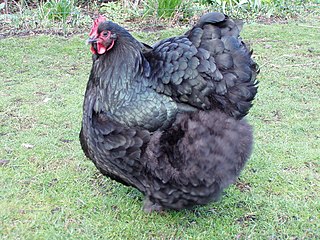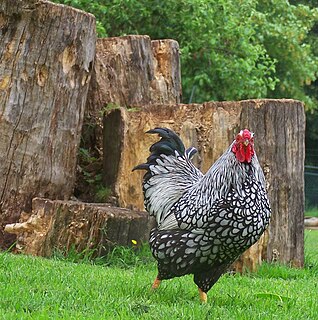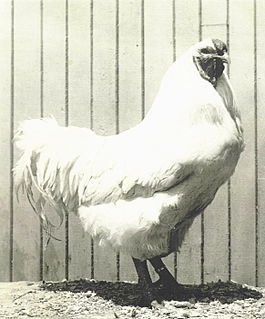
The Silkie is a breed of chicken named for its atypically fluffy plumage, which is said to feel like silk and satin. The breed has several other unusual qualities, such as black skin and bones, blue earlobes, and five toes on each foot, whereas most chickens only have four. They are often exhibited in poultry shows, and appear in various colors. In addition to their distinctive physical characteristics, Silkies are well known for their calm, friendly temperament. It is among the most docile of poultry. Hens are also exceptionally broody, and care for young well. Though they are fair layers themselves, laying only about three eggs a week, they are commonly used to hatch eggs from other breeds and bird species due to their broody nature.

The Leghorn is a breed of chicken originating in Tuscany, in central Italy. Birds were first exported to North America in 1828 from the Tuscan port city of Livorno, on the western coast of Italy. They were initially called "Italians", but by 1865 the breed was known as "Leghorn", the traditional anglicisation of "Livorno". The breed was introduced to Britain from the United States in 1870. White Leghorns are commonly used as layer chickens in many countries of the world. Other Leghorn varieties are less common.

The Orpington is a British breed of chicken. It was bred in the late nineteenth century by William Cook of Orpington, Kent, in south-east England. It was intended to be a dual-purpose breed, to be reared both for eggs and for meat, but soon became exclusively a show bird.

The Cochin is a breed of large domestic chicken. It derives from large feather-legged chickens brought from China to Europe and North America in the 1840s and 1850s. It is reared principally for exhibition. It was formerly known as Cochin-China.

The Brahma is an American breed of chicken. It was developed in the United States from birds imported from the Chinese port of Shanghai, and was the principal American meat breed from the 1850s until about 1930.

The Serama, also called the Malaysian Serama, is a bantam breed of chicken originating in Malaysia within the last 50 years.

The Sussex is a British breed of dual-purpose chicken, reared both for its meat and for its eggs. Eight colours are recognised for both standard-sized and bantam fowl. A breed association, the Sussex Breed Club, was organised in 1903.

The Japanese Bantam or Chabo is a Japanese breed of ornamental chicken. It is a true bantam breed, meaning that there are no large fowl counterparts. It characterised by very short legs and a large upright tail that reaches much higher than the head of the bird.

The Wyandotte is an American breed of chicken developed in the 1870s. It was named for the indigenous Wyandot people of North America. The Wyandotte is a dual-purpose breed, kept for its brown eggs and its yellow-skinned meat. It is a popular show bird, and has many color variants. It was originally known as the American Sebright.

The Ancona is a breed of chicken which originated in the Marches, region of Italy, but which was bred to its present type mainly in the United Kingdom in the nineteenth century. It is named after the city of Ancona, capital of the Marche. It is popular in Britain and the United States, but uncommon in Italy; an initiative to re-establish it in its native area and preserve its biodiversity was launched in 2000. There are also Ancona bantams.
Hollands are a fairly rare breed of large chickens that are dual purpose and originate from America. They are hard to tell from Plymouth rocks and Dominiques, but can be recognized as the Plymouth Rock has colored feet and the Dominique has a rose comb.

The New Hampshire Red or New Hampshire is an American breed of chicken. It was developed in the early twentieth century in the state of New Hampshire by selective breeding of Rhode Island Red stock; no other breed was involved. It is fast-growing, early-maturing, quick-feathering, and yields a meaty carcase. Mature birds are a light or medium red in color; they may fade in sunlight.

The Minorca, Catalan: Gallina de Menorca, Spanish: Menorquina, is a breed of domestic chicken originating in the Mediterranean island of Menorca, in the Balearic Islands to the south-east of Spain. It is a well-known exhibition bird in many countries of the world, but in the island of Menorca is an endangered breed and considered to be at risk of extinction.

The Norfolk Grey is a utility breed of chicken that originated near the city of Norwich, in Norfolk, England, in around 1910. The breed was originally created by Frederick W Myhill of Hethel, Wymondham under the name Black Maria. It is a rare breed which is currently considered to be at risk by the Rare Breeds Survival Trust.

The Modern Game is a breed of ornamental chicken which originated in England between 1850 and 1900. Purely an exhibition bird, Modern Game were developed to be most aesthetically pleasing and to epitomize the visual appeal of the gamecock or fighting cock.

The Chantecler is a breed of chicken originating in Canada. The Chantecler was developed in the early 20th century, at the Abbey of Notre-Dame du Lac in Oka, Quebec. It is extremely cold-resistant, and is suitable for both egg and meat production.

The Java is a breed of chicken originating in the United States. Despite the breed's name, a reference to the island of Java, it was developed in the U.S. from chickens of unknown Asian extraction. It is one of the oldest American chickens, forming the basis for many other breeds, but is critically endangered today. Javas are large birds with a sturdy appearance. They are hardy, and are well-suited for both meat and egg production, especially by small-scale farms, homesteads, and backyard keepers.

The Ayam Cemani is a rare breed of chicken from Indonesia. They have a dominant gene that causes hyperpigmentation (fibromelanosis), making the chicken mostly black, including feathers, beak, and internal organs. The Cemani is a very popular gamecock for cockfighting in Bali because their thighs have much more muscle compared to other chickens, which leads to them being much faster.

The Ayam Kampong or Ayam Kampung is the chicken breed reported from Indonesia and Malaysia. The name means simply "free-range chicken" or literally "village chicken". In Indonesia, the term ayam kampung refer to indigenous chickens that are raised using traditional free range production techniques by almost every household in the village. It is a diverse population which resulted from the uncontrolled cross-breeding of red jungle-fowl, indigenous Southeast Asian chickens and exotic chickens of various types imported in the late 1800s by European, mainly Dutch and British, settlers.

Altsteirer, also known as the Styrian Hen and Chicken, Slovene: Štajerska kokoš or Štajerka, German: Altsteirer Huhn, is an autochthonous breed of domestic chicken originating in Slovenia and Austrian state Styria. The Styrian Hen is known as the only autochthonous (native) chicken breed of Slovenian area, with all other breeds being traditional at most, hence introduced in the past and consequently adapted to country's conditions. The Altsteirer's set of traits suggests the breed may share a common descent with other Mediterranean chicken breeds.


















